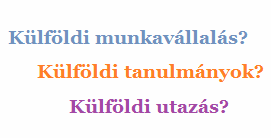A passzív szerkezetek a magyar nyelvtől mára már eléggé idegenül csengő, régies forma. Az indogermán nyelvekben azonban fennmaradt és nagyon gyakran használt szerkezet. „A -tatik,-tetik szerkezet a magyar nyelvben nem használtatik, kivéve a születik”.
Használata: az úgynevezett aktív mondattal szemben, ahol alannyal kezdjük a mondatot, a passzív mondatban nem a cselekvőn, hanem a cselekvésen van a hangsúly. A cselekvő nem lényeges, nem tudjuk ki az, vagy nem akarjuk megnevezni.
Képzése: be + a főige 3. alakja Az aktív mondat tárgya válik a passzív mondat alanyává. Az eredeti alanyt a by kötőszóval tudjuk a keretbe foglalni.
| Igeidő | Alany | Ige | Tárgy | |
|---|---|---|---|---|
| Simple Present | Active: | Sue | reads | a book. |
| Passive: | A book | is read | by Sue. | |
| Simple Past | Active: | Sue | read | a book. |
| Passive: | A book | was read | by Sue. | |
| Present Perfect | Active: | Sue | has read | a book. |
| Passive: | A book | has been read | by Sue. | |
| Future I | Active: | Sue | will read | a book. |
| Passive: | A book | will be read | by Sue. | |
| Segédige | Active: | Sue | can read | a book. |
| Passive: | A book | can be read | by Sue. | |
| Igeidő | Alany | Ige | Tárgy | |
|---|---|---|---|---|
| Present Continuous |
Active: | Sue | is reading | a book. |
| Passive: | A book | is being read | by Sue. | |
| Past Continuous |
Active: | Sue | was reading | a book. |
| Passive: | A book | was being read | by Sue. | |
| Past Perfect | Active: | Sue | had read | a book. |
| Passive: | A book | had been read | by Sue. | |
| Future II | Active: | Sue | will have read | a book. |
| Passive: | A book | will have been read | by Sue. | |
| Conditional I | Active: | Sue | would read | a book. |
| Passive: | A book | would be read | by Sue. | |
| Conditional II | Active: | Sue | would have read | a book. |
| Passive: | A book | would have been read | by Sue. | |
Mint látjuk a különböző igeidők sajátos passzív szerkezettel rendelkeznek. Ezek tulajdonképpen az adott igeidő jellemző szerkezetei a passzív „be +3. alak”-kal összefésülve. Mindig a passzív szerkezetet az adott igeidőre jellemző szerkezettel vezetjük be, majd a passzív szerkezet be igéje, ami elszenvedi a változásokat, a főige pedig mindig 3. alakba fog kerülni és zárja az igék sorát.
Gyakorlatok
- the picture / paint (Simple Present)
- the door / open (Simple Past)
- the house / clean (Present Continuous)
- the car/ wash (Past Continuous)
- the window/ close (Present Perfect)
- the homework / do (Past perfect)
- the window / break (Simple future)
- the letter/ write (Should + Verb)
| Somebody cleans the room every week. The room is cleaned every week. | |
| 2) Somebody sends emails . Emails are sent. | |
| 3) Somebody is washing the car. The car is being washed. | |
| 4) Somebody has eaten chocolate . Chocolate has been eaten. | |
| 5) Somebody often steals bikes. Bikes are often stolen. | |
| 6) Somebody is playing loud music . Loud music is being played. | |
| 7) Somebody was speaking German here . German was being spoken here. | |
| 8) Somebody loves the London parks . London parks are loved. | |
| 9) Somebody has drunk beer . Beer has been drunk. | |
| 10) Somebody writes a book . A book is written. | |
| 11) Somebody loves him. He is loved. | |
| 12) Somebody is using a computer . A computer is being used. | |
| 13) Somebody cooks dinner every day . Dinner is cooked every day. | |
| 14) Somebody bought milk in the mornings . Milk was bought every day. | |
| 15) Somebody is going to buy flowers for the flat . Flowers are going to be bought for the flat. | |
| 16) Somebody washes the car every week . The car is washed every week. | |
| 17) Somebody will write a report by Friday . The report will be written by Friday. | |
| 18) Somebody is fixing the roads . The roads are being fixed. | |
| 19) Somebody builds new houses every year . New houses are built every year. | |
| 20) Somebody is going to sell vegetables in the market. Vegetables are going to be sold in the market. | |
Speciális szerkezetek:
They say he is 100 years old. – He is said to be 100 years old. It is said that he is 100 years old. 100 évesnek mondják.

